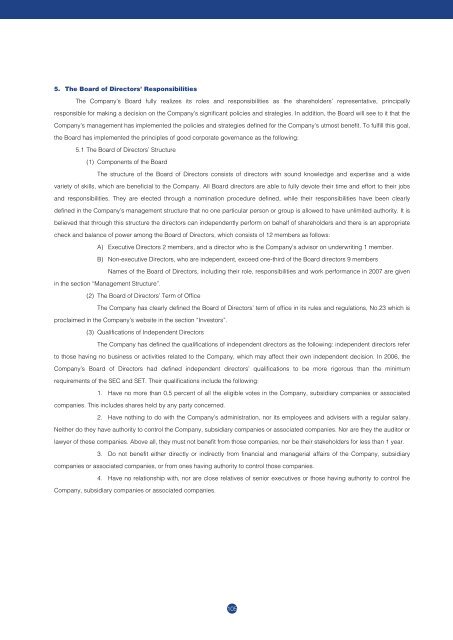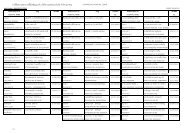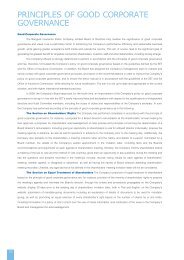Year 2007
Year 2007
Year 2007
You also want an ePaper? Increase the reach of your titles
YUMPU automatically turns print PDFs into web optimized ePapers that Google loves.
5. The Board of Directors’ Responsibilities<br />
The Company’s Board fully realizes its roles and responsibilities as the shareholders’ representative, principally<br />
responsible for making a decision on the Company’s significant policies and strategies. In addition, the Board will see to it that the<br />
Company’s management has implemented the policies and strategies defined for the Company’s utmost benefit. To fulfill this goal,<br />
the Board has implemented the principles of good corporate governance as the following:<br />
5.1 The Board of Directors’ Structure<br />
(1) Components of the Board<br />
The structure of the Board of Directors consists of directors with sound knowledge and expertise and a wide<br />
variety of skills, which are beneficial to the Company. All Board directors are able to fully devote their time and effort to their jobs<br />
and responsibilities. They are elected through a nomination procedure defined, while their responsibilities have been clearly<br />
defined in the Company’s management structure that no one particular person or group is allowed to have unlimited authority. It is<br />
believed that through this structure the directors can independently perform on behalf of shareholders and there is an appropriate<br />
check and balance of power among the Board of Directors, which consists of 12 members as follows:<br />
A) Executive Directors 2 members, and a director who is the Company’s advisor on underwriting 1 member.<br />
B) Non-executive Directors, who are independent, exceed one-third of the Board directors 9 members<br />
Names of the Board of Directors, including their role, responsibilities and work performance in <strong>2007</strong> are given<br />
in the section “Management Structure”.<br />
(2) The Board of Directors’ Term of Office<br />
The Company has clearly defined the Board of Directors’ term of office in its rules and regulations, No.23 which is<br />
proclaimed in the Company’s website in the section “Investors”.<br />
(3) Qualifications of Independent Directors<br />
The Company has defined the qualifications of independent directors as the following: independent directors refer<br />
to those having no business or activities related to the Company, which may affect their own independent decision. In 2006, the<br />
Company’s Board of Directors had defined independent directors’ qualifications to be more rigorous than the minimum<br />
requirements of the SEC and SET. Their qualifications include the following:<br />
1. Have no more than 0.5 percent of all the eligible votes in the Company, subsidiary companies or associated<br />
companies. This includes shares held by any party concerned.<br />
2. Have nothing to do with the Company’s administration, nor its employees and advisers with a regular salary.<br />
Neither do they have authority to control the Company, subsidiary companies or associated companies. Nor are they the auditor or<br />
lawyer of these companies. Above all, they must not benefit from those companies, nor be their stakeholders for less than 1 year.<br />
3. Do not benefit either directly or indirectly from financial and managerial affairs of the Company, subsidiary<br />
companies or associated companies, or from ones having authority to control those companies.<br />
4. Have no relationship with, nor are close relatives of senior executives or those having authority to control the<br />
Company, subsidiary companies or associated companies.<br />
105







